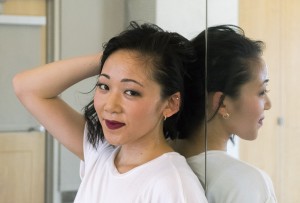Five-year-old Jackie Oka discovered the secret to achieving elementary school fame.
Stepping on the talent show stage to perform for the first time, Oka broke out into dance to Britney Spears’ “Oops!… I Did it Again,” imitating hip shaking and twirls straight from the choreography in the music video. She was then known by the rest of the school as “the Britney Spears girl,” a title that would stick for the rest of her grade school years.
“To me, it was just jumping around, having fun,” Oka said. “It was just something I loved to do. I didn’t realize I was performing for all these people.”
Oka, a UCLA alumna, doubted her knack for dancing could ever amount to much. Now, she is part of the hip-hop dance company Versa-Style, where she is a principal dancer and school programs coordinator. As principal dancer she travels with the group to perform all over the world, including free shows she organizes for middle schools and high schools in the Los Angeles area.

Oka hopes her work with Versa-Style will change the prevalent misconceptions about hip-hop culture. She said she is disappointed that hip-hop can be misrepresented in the media, especially in music videos that often taint the genre as a culture revolving around sex, drugs and money.
“Girls half naked and champagne being poured all over them – that doesn’t speak hip-hop to me,” Oka said. “To me, hip-hop now is just a vehicle to pursue your dreams, pursue your goals, further your artistic abilities.”
Oka had always performed before she started to take it seriously as a career, said Russell Oka, Jackie Oka’s older brother. She would dance around her living room, take the stage in school talent shows or perform as part of her elementary school’s cheerleading team.
“She had this great stage presence, facial expressions and really high energy,” Russell Oka said. “She’s always not been afraid to dance in front of other people.”
In middle school, Oka joined a jazz competition team that required her to take classes in various styles of dance, including ballet. But Oka dreaded heading to the ballet barre, as she was always itching to take off her leotard and tights and rip her hair out of its tight bun. That ballet class became her last.
Out of all the dance classes she took, Oka said she felt most comfortable in hip-hop. She could let her hair down, wear whatever she wanted to class and freely express herself in what she said was a more liberating environment.
“That’s what I really love about it is that there’s no boundaries – you don’t have to be super skinny or be a long-legged bun-head to be part of this culture,” Oka said.
As a principal dancer for Versa-Style, Oka takes a different perspective on hip-hop dancing than the choreography-based approach many hip-hop dancers adopt today. She instead focuses on different hip-hop social dances throughout the decades, paying homage to hip-hop as a cultural form of expression that she said developed from the streets and neighborhoods of certain areas.
At UCLA, Oka was a member of the Cultural Affairs Commission’s Hip Hop Congress, which produces a workshop series as part of its Hip Hop Appreciation Month.
Oka organized a dance workshop for UCLA students that taught hip-hop cyphering and popular street-style dances like the Biz Markie and the whip. During the workshop, she watched her peers, enjoying themselves as they learned about hip-hop history.
“Seeing that raw essence of having fun and community, everyone together and just dancing together, I really felt that as a hip-hop dancer, it was in me to give this opportunity,” Oka said.
Her own meaning of hip-hop has given life to her performances and a fiery passion to her dancing, said Harry Weston, Versa-Style’s company manager and a mentor of Oka’s. At a Versa-Style performance at the San Francisco International Hip Hop DanceFest in November 2015, Weston saw Oka captivate an audience of nearly a thousand.
“She just commanded the entire audience with this choreographed solo. We all kind of stopped and were pretty amazed,” Weston said. “It’s not an easy thing to do.”
When on stage, Oka is mindful of the many eyes watching her and possibly connecting with her performance – a much different feeling from when she danced casually as a child. She now feels a sense of responsibility, a commitment to exemplifying hip-hop culture in a respectful way.
In Scotland, Oka had just finished a performance with Versa-Style at a booking festival when a young girl from the crowd walked up to Oka and told her she was moved by her dancing. In that moment, Oka said she was reassured of why she chose to pursue hip-hop dance.
“I want to change someone’s life,” Oka said. “That’s what’s rewarding for me.”
